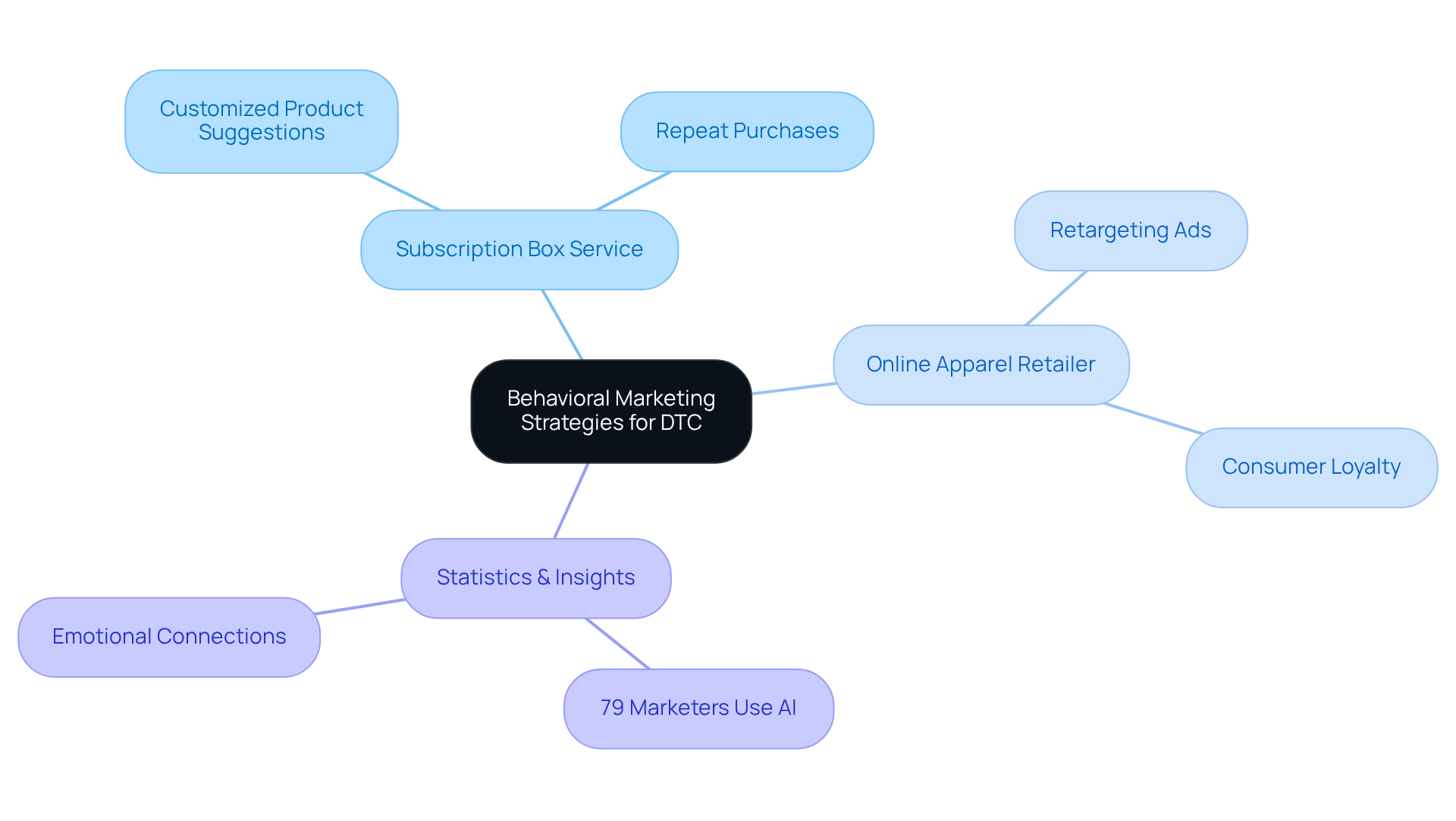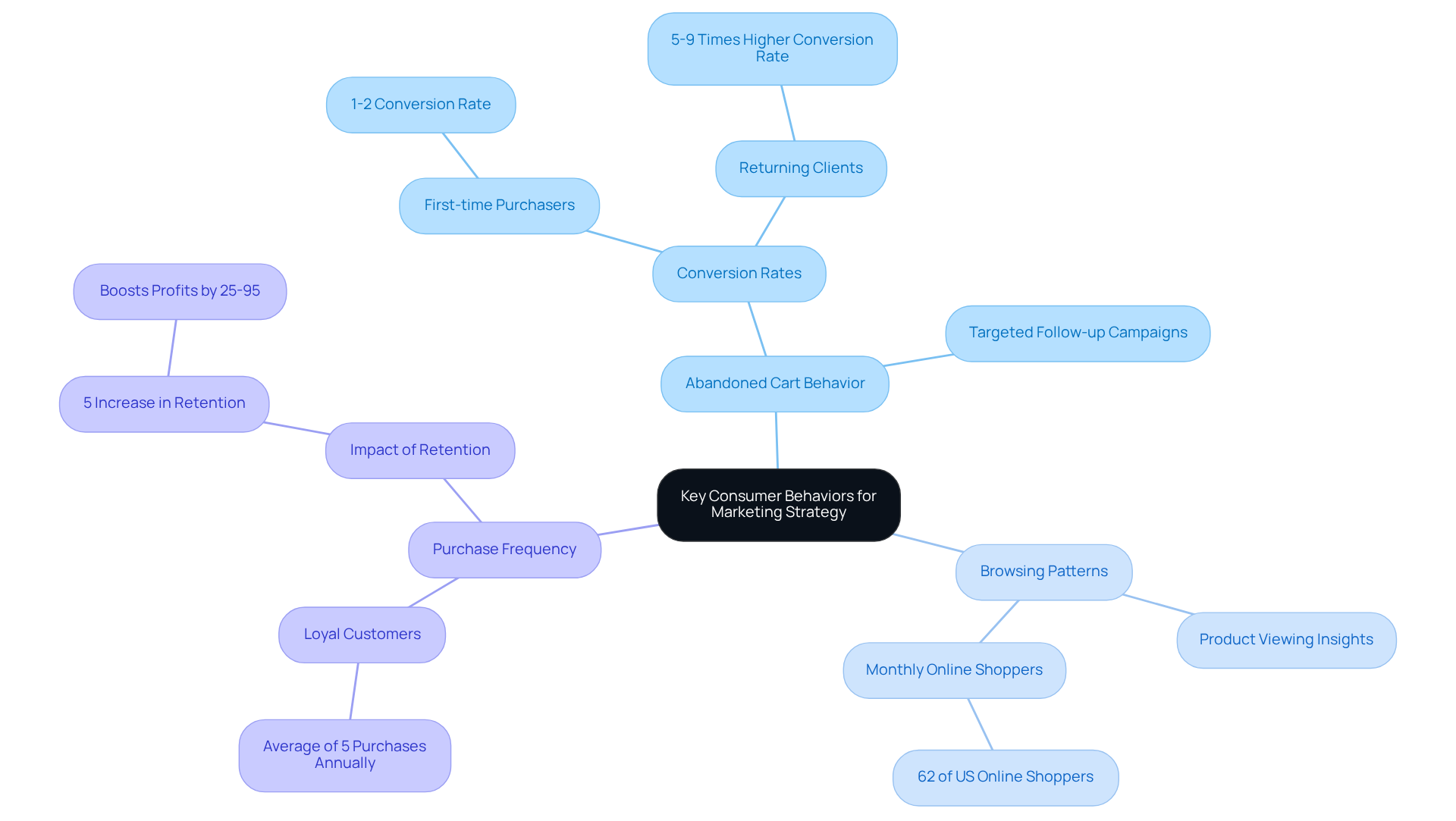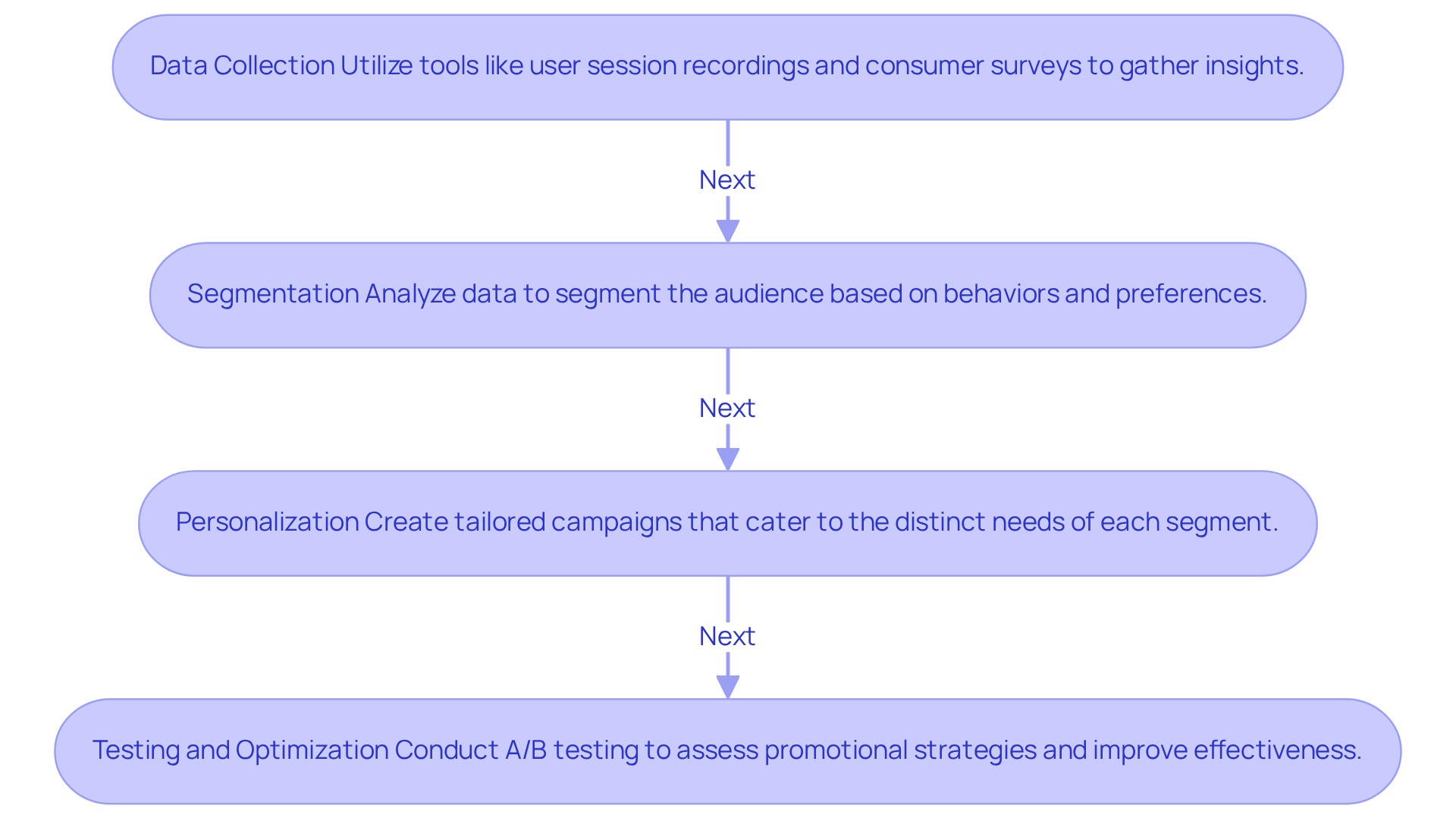
Overview
The article asserts that effective behavioral marketing strategies are essential for enhancing direct-to-consumer (DTC) brand success. By leveraging consumer behavior data, brands can create personalized marketing experiences that resonate with their audience. This assertion is backed by compelling evidence demonstrating increased conversion rates and heightened customer satisfaction through tailored campaigns.
Case studies illustrate significant revenue growth for brands that have successfully implemented these strategies, reinforcing the idea that personalized marketing is not just beneficial but crucial for success in today's competitive landscape.
Introduction
Behavioral marketing has emerged as a transformative force for direct-to-consumer (DTC) brands, harnessing consumer behavior data to craft personalized shopping experiences that resonate with individual preferences. This tailored approach not only elevates customer satisfaction but also catalyzes substantial increases in conversion rates and average order values. However, as brands endeavor to implement these strategies, they frequently encounter challenges that can impede their effectiveness.
How can DTC companies adeptly navigate these complexities to fully leverage the power of behavioral marketing and secure enduring success?
Define Behavioral Marketing and Its Relevance to DTC Brands
Behavioral marketing represents a strategic approach to utilizing consumer behavior data for tailored promotional efforts, making it essential for direct-to-consumer (DTC) companies. This method empowers companies to craft promotional strategies that resonate with individual consumers by analyzing data such as browsing history, purchase patterns, and engagement metrics. Notably, 80% of consumers aged 18-64 are more inclined to purchase from companies that provide personalized shopping experiences, underscoring the effectiveness of tailored marketing.
By harnessing behavioral insights, DTC companies can design targeted campaigns that meet the specific needs and desires of their audience. This approach not only enhances the overall customer experience but also significantly elevates conversion rates. In fact, personalized product recommendations can boost average order value by as much as 369% in comparison to generic suggestions. Thus, emerges as a pivotal strategy for companies aiming to enhance their promotional efforts without incurring additional advertising costs.
Parah Group's case studies exemplify the success of behavioral strategies in driving revenue growth. For instance, a $30M apparel company collaborated with Parah Group to improve its conversion rates through initiatives such as redesigning the homepage to emphasize social proof and optimizing product pricing. Consequently, they realized a 35% increase in conversion rates and a 10% rise in revenue per visitor. Similarly, a $15M cleaning product brand experienced an 80% increase in average order value by implementing free shipping thresholds and bundling items, illustrating the substantial profitability that effective behavioral strategies can yield.
Expert insights highlight the importance of behavioral marketing within today’s competitive landscape. Marketers assert that understanding consumer behavior is crucial for fostering strong relationships with clients, which can be enhanced through behavioral marketing to ultimately drive loyalty and repeat purchases. However, it is crucial to acknowledge that 96% of retailers encounter challenges with effective personalization, revealing common pitfalls that DTC companies must navigate.
In conclusion, by focusing on tailored experiences and understanding consumer behavior, DTC brands can effectively differentiate themselves and cultivate lasting relationships with their clients. The application of behavioral marketing techniques, as evidenced by Parah Group's successful outcomes, not only enhances client satisfaction but also propels substantial business growth. Parah Group sets itself apart among CRO agencies by prioritizing profitability and sustainable growth, ensuring that their methods not only achieve short-term goals but also contribute to long-term success.

Explore Effective Examples of Behavioral Marketing for DTC Implementation
Numerous DTC brands have effectively harnessed behavioral marketing to enhance audience engagement and conversion rates. A prominent subscription box service exemplifies this by utilizing client data to customize product suggestions based on past purchases and browsing activity. This tailored method significantly boosts the chances of repeat purchases while greatly improving client satisfaction.
Similarly, an online apparel retailer employs retargeting ads that remind users of items they previously viewed but did not purchase. Such approaches not only increase sales but also nurture a stronger relationship between the company and the consumer, fostering .
Statistics reveal that 79% of marketers utilize AI to tailor content, underscoring the significance of data-driven approaches in enhancing user experiences. Furthermore, companies that invest in understanding their customers on a deeper level tend to excel in retention rates, as emotional connections are vital for long-term success.
As the DTC market continues to evolve, applying effective behavioral marketing strategies will be crucial for companies seeking to thrive in a competitive environment.

Identify Key Consumer Behaviors to Target in Your Marketing Strategy
To effectively leverage behavioral marketing, DTC brands must focus on several pivotal consumer behaviors:
- Abandoned Cart Behavior: Understanding the reasons behind cart abandonment is crucial. Research indicates that first-time purchasers convert at an average of just 1-2%, while returning clients convert at rates 5-9 times greater. By analyzing this behavior, companies can leverage behavioral marketing to create targeted follow-up campaigns that encourage customers to complete their purchases, significantly boosting conversion rates.
- Browsing Patterns: Analyzing which products consumers spend the most time viewing provides valuable insights into inventory management and promotional strategies. With 62% of US online shoppers making retail purchases online at least once a month, identifying helps brands optimize their offerings and marketing efforts.
- Purchase Frequency: Understanding how often buyers make purchases is essential for tailoring loyalty programs and personalized offers. Loyal ecommerce clients typically make about five purchases annually, and boosting client retention by just 5% can enhance profits by 25-95%. By concentrating on these metrics, companies can utilize behavioral marketing to develop impactful promotional plans that resonate with their audience and increase conversions.

Integrate Behavioral Marketing into Your DTC Strategy for Enhanced Engagement
To effectively incorporate behavioral promotion into your DTC strategy, it is essential to follow these key steps:
- Data Collection is paramount. Utilize tools such as user session recordings and consumer surveys to gather valuable insights into . This foundational data is crucial for understanding how customers interact with your brand.
- Next, move to Segmentation. Analyze the collected data to segment your audience based on behaviors and preferences. This targeted approach enables customized promotional messages that resonate with specific groups.
- Following that, focus on Personalization. Utilize insights from your segmentation efforts to create tailored campaigns that cater to the distinct needs and interests of each segment. Personalized experiences can significantly enhance customer engagement.
- Then, implement Testing and Optimization. Conduct ongoing A/B testing to assess various promotional strategies and identify what resonates best with your audience. Consistently improving your strategy based on performance data ensures that your promotional efforts remain effective and relevant.
By adopting these steps, DTC brands can harness the power of behavioral marketing to increase engagement and drive conversions, ultimately enhancing profitability.

Conclusion
By embracing behavioral marketing, DTC brands can effectively tailor their strategies to meet the unique needs of their consumers, ultimately driving engagement and enhancing profitability. This approach leverages consumer behavior data to create personalized experiences that resonate with individual shoppers and foster long-term loyalty.
Key insights from the article underscore the importance of understanding consumer behaviors such as:
- Cart abandonment
- Browsing patterns
- Purchase frequency
These behaviors serve as critical touchpoints for DTC companies to develop targeted marketing strategies that boost conversion rates and improve customer satisfaction. Successful case studies further illustrate how behavioral marketing can lead to significant revenue growth, demonstrating its value in today’s competitive landscape.
As the DTC market continues to evolve, the integration of effective behavioral marketing strategies becomes essential for brands seeking to thrive. By focusing on personalization and data-driven insights, companies can cultivate deeper connections with their customers, ensuring sustained success and profitability in the long run. Embracing these best practices not only enhances customer engagement but also positions DTC brands as leaders in their industry.
Frequently Asked Questions
What is behavioral marketing?
Behavioral marketing is a strategic approach that utilizes consumer behavior data to create tailored promotional efforts, making it essential for direct-to-consumer (DTC) companies.
Why is behavioral marketing important for DTC brands?
Behavioral marketing allows DTC brands to craft promotional strategies that resonate with individual consumers, enhancing the customer experience and significantly increasing conversion rates.
How does personalized marketing impact consumer purchasing behavior?
Personalized marketing can lead to higher purchase likelihood, as 80% of consumers aged 18-64 prefer to buy from companies that offer personalized shopping experiences.
What are the potential benefits of using behavioral marketing?
Behavioral marketing can boost average order value by as much as 369% through personalized product recommendations, compared to generic suggestions.
Can you provide examples of successful behavioral marketing strategies?
Yes, a $30M apparel company increased its conversion rates by 35% and revenue per visitor by 10% through homepage redesign and optimized pricing. A $15M cleaning product brand saw an 80% increase in average order value by implementing free shipping thresholds and bundling items.
What challenges do retailers face with behavioral marketing?
96% of retailers encounter challenges with effective personalization, highlighting common pitfalls that DTC companies must navigate.
How does behavioral marketing contribute to customer loyalty?
By understanding consumer behavior and fostering strong relationships through tailored marketing, DTC brands can drive customer loyalty and encourage repeat purchases.
What distinguishes Parah Group in the context of behavioral marketing?
Parah Group prioritizes profitability and sustainable growth, ensuring that their behavioral marketing methods achieve both short-term goals and contribute to long-term success for their clients.
FAQs











